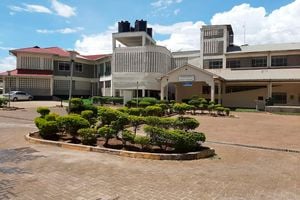
The Social Health Authority building in Nairobi.
Civil servants have been spared the agony most Kenyans are enduring in the roll-out of the Social Health Insurance Fund (SHIF) as they continue benefitting from comprehensive medical cover under the old order.
As grievances pile up over the new healthcare system, including protests about the minimal settlement of medical expenses by the Social Health Authority (SHA) and limited benefits for most Kenyans, civil servants are not only getting priority treatment in facilities but are also enjoying unlimited cover.
Amid the struggle by a majority with the transition from the National Health Insurance Fund (NHIF) to SHIF, with many hospitals experiencing hiccups, nearly one million civil servants still benefit from services under NHIF. They have been spared the agony that the rest are undergoing during the transition. Even after the extension of the current comprehensive cover expiration on December 31, civil servants will secure a new scheme with equivalent benefits under SHA.
Civil servants, widely considered the backbone of government operations, are being accorded priority under the system, leaving the rest to grapple with inequities in access and quality of care. Private sector employees, who have to also pay 2.75 per cent of their gross pay monthly for state cover out of their reach, have to rely on their private medical cover as the public system discriminates against them.
Hospitals are now working with two claims systems: one for civil servants through the Hospital Integrated Claims System and another for the general public via Savannah Informatics.
“Civil servants receive benefits under a comprehensive medical insurance scheme, which differs significantly from those available to other Kenyans, and their treatment is also distinct,” said Dr Brian Lishenga, the chairman of the Rural-Urban Private Hospitals Association.
While civil servants enjoy preferential treatment, citizens in the private sector—who often pay higher premiums for similar or lesser health packages—find themselves on the sidelines.
“It feels like we are second-class citizens in our own country,” lamented Mary Wanjiru, an employee of a media house. “We pay more, but when it comes to getting services, we’re left to fend for ourselves.”
“Last week, I was unwell and went to one of the leading private hospitals. At the counter, I was asked if I was a civil servant. When I questioned why, the attendant explained that she needed to know which claim to open and what services I was entitled to. This made me think: Are we receiving different treatment based on where we work? This is concerning,” Mary added.
For many private sector employees and self-employed individuals, the high cost of health packages, coupled with limited access to quality care, remains a significant burden.
At public hospitals, the strain is evident. Long queues, shortages of medical supplies, and staff shortages exacerbate frustrations for the common mwananchi, even as civil servants are directed to better-resourced facilities.
Public Officers Medical Scheme Fund
On Tuesday, the Ministry of Public Service and Human Capital Development announced that from January, the Public Officers Medical Scheme Fund will be administered as the civil servants’ medical insurance scheme expires on December 31. The scheme will be administered under SHA.
“As you are aware, the extension of the civil servants’ scheme will lapse [at the] end of this year. Subsequently, the State Department for Public Service, in consultation with other stakeholders, has resolved that the Public Officers Medical Scheme Fund be established effective from January 1, 2025. The fund shall be administered by SHA, which has been mandated to provide a benefit package equivalent to the comprehensive medical insurance cover for civil servants,” wrote Mr Amos Gathecha, the Principal Secretary. “Service providers have been informed to ensure all national government employees in ministries and state departments, officers seconded to the counties, National Youth Service staff and their dependants access uninterrupted medical cover with effect from January.”
With the statement, the new fund replaces the longstanding comprehensive medical insurance scheme for civil servants and disciplined services, which has been under NHIF since January 1, 2012. The new fund for civil servants will require Kenyans to finance the scheme independent of SHIF. With the approval, it means that the government will allocate more funding to cover health benefits for public officers beyond the limits of the SHIF programme.
In October this year, the Ministry of National Treasury & Economic Planning published the Public Finance Management (Public Officers Medical Scheme Fund) Regulations, 2024. The bill proposed a new health fund designed to support SHIF benefits available to all civil servants.
However, under SHIF, all Kenyans, regardless of their contribution, have access to integrated preventive, promotive, curative, rehabilitative, and palliative health services at levels 4, 5, and 6 health facilities. The benefits are, however, not comprehensive unless one pays more. “The fund will enable civil servants first to receive a comprehensive range of quality health services from SHA, once this is exhausted, proceed with the limits provided for under Public Officers’ Medical Scheme,” the draft reads.
Under their previous medical cover, all civil servants and disciplined service members enjoyed a comprehensive medical insurance scheme that covered the principal member and up to six dependants. The benefits package included outpatient and inpatient services, specialised services, dental and optical care, annual medical check-ups for the member and spouse, road ambulance services, emergency air rescue, overseas treatment, group life, and last expense cover.
According to the bill, funds recovered from medical benefits will be directed to the newly established fund supporting the scheme. Civil servants and other participating public servants will continue contributing to and benefiting from SHA through payroll deductions. “The State Department of Public Service will receive funds from the medical benefits recovered, being part of public officers' contractual remunerations,” the draft reads.
Extra benefits
Although SHA was put in place to cover all Kenyans and offer everyone the same quality of care regardless of their income, if this bill is passed, the public officials will enjoy extra benefits in addition to the benefits received as per their 2.75 per cent on SHA.
The benefits and limits under SHA for the general public remain uniform, regardless of their monthly contributions to the national insurance scheme.
Mr Harry Kimtai, the Medical Services Principal Secretary, on October 30 told Kenyans who needed extra care or felt their deductions were too high to acquire private insurance coverage.
“You do not say that if you are paying more in terms of your income, you should get more benefits. It’s standard. If you like extra, you can pay for another private cover,” Mr Kimtai said.
Under NHIF, civil servants enjoyed broader coverage, higher reimbursement rates, and access to private and faith-based facilities for specialised treatments, minimising out-of-pocket expenses. The introduction of SHIF offers different limits, depending on an employee’s job grade and group. The benefits are categorised into different sections: inpatient, outpatient, dental/maternity, optical, and charges within the inpatient limit.
CSG 17-13 (Job Group A-G, H) receive inpatient coverage of Sh700,000, outpatient limit of Sh70,000, up to Sh50,000 for dental or maternity expenses and Sh40,000 for optical care. An additional amount of Sh100,000 is charged within the inpatient limit. Moreover, CSG 11, 10 (Job Group JG 3, K) receive the same inpatient, outpatient, dental/maternity, and optical benefits as the previous groups. However, the amount charged within the inpatient limit increases to Sh150, 000.
CSG 7 (Job Group P) enjoys inpatient coverage of Sh1,750,000, with Sh225,000 for outpatient services, Sh50,000 for dental/maternity, and Sh50,000 for optical services. An extra Sh40,000 is charged within the inpatient limit. CSG 6-4 (Job Group Q, R, S, T), the senior civil servants in these grades receive the highest coverage, with inpatient limits of Sh2,500,000. Outpatient coverage is Sh350,000, with dental/maternity at Sh50,000 and optical at Sh40,000.
An additional amount of Sh200,000 is charged within the inpatient limit. This is different from what the general public is getting and is entitled to under SHIF. For instance, under SHIF, the government will pay only Sh10,000 for a woman giving birth through normal delivery and Sh34,200 for a caesarean section, as per the benefits package for the general public.
Dr Davji Attellah, the secretary general of the Kenya Medical Practitioners and Dentists Union, said civil servants are employees of the government. “Since SHA is covering a percentage, as civil servants, the employer, who is the government, has to cover the difference.”
Comprehensive package
“From SHA cover, it had a provision whereby employers can provide for employees’ comprehensive package and even in the Labour Relations Act, it is the responsibility of the employer to provide cover,” Dr Atellah said.
He added: “Since SHA is covering a percentage, as civil servants, the employer, who is now the government, has to cover the difference.”
This means that mothers who want to give birth in private facilities may need to pay out of pocket, or hospitals may need to adjust their rates based on the rates of the Fund, unlike the civil servants who still have additional amounts which can be charged from their cover.
Public hospitals charge between Sh10, 000 and Sh28,000 for a normal delivery and Sh30,000 for a caesarean section with private facilities charging as much as Sh125,000 for a normal delivery and Sh270,000 for a caesarean section.
Dr Davji Attellah, the secretary general of the Kenya Medical Practitioners and Dentists Union, who has been at the forefront of fighting for doctors employed by the national government, indicated that civil servants are employees of the government just like other employers.
“From SHA cover, it had a provision whereby employers can provide for employees’ comprehensive package and even in the Labour Relations Act, it is the responsibility of the employer to provide cover,” Dr Atellah said.
He added: “Since SHA is covering a percentage, as civil servants, the employer, who is now the government, has to cover the difference.”
But ideally, he said, for SHA the packages should have been that Kenyans do not need to pay anything extra.
“For the health care workers, our medical allowance which was about Sh60,000 to Sh100,000 is not being paid to us, it was scrapped, and this is going to SHA. Above the 2.75 per cent, there is an extra package that goes to the government,” Dr Atellah said.
An official from the Ministry of Health defended the system adding that he found the comprehensive medical cover in place and will not be the one to be seen to be scrapping it.
“Prioritising one group over another creates a precedent that undermines the principle of equitable access. If we continue down this path, we risk institutionalising a two-tier healthcare system. This I cannot bring to the table now since I got here and found things like this. Who am I to start contradicting them,” he said, adding that something needs to be done.












